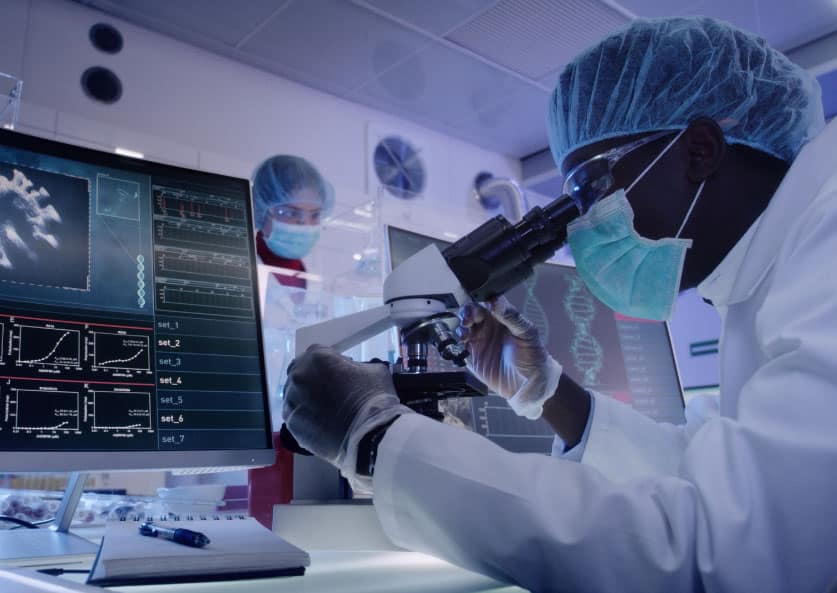THE IMMUNE SYSTEM AND AGING
Discover the connection between your immune system and healthy aging
Understanding how your immune system changes with age can help you make decisions to protect yourself. Staying up to date on your vaccines is especially important to help you fight off infections. The information below can help guide you through the complexities of your immune health as you age.
Aging causes changes in the immune system that weaken its ability to identify and eliminate pathogens efficiently. This can lead to a higher risk of infections and a decline in overall well-being.1
Key changes include:
Increased inflammation
Alterations in the immune system that occur in response to age-related changes and obesity can contribute to increased inflammation in the body, raising the risk for certain diseases.2 For example, Alzheimer’s disease has been linked to increased inflammation.3
Shrinking of the thymus
The thymus, a small organ in your chest that is instrumental in producing T cells (a type of white blood cell), gets smaller in size as we age. This “thymus shrinkage” is a natural process that can affect immune health by reducing the production of new T cells, which play an important role in supporting immune responses.4
Reduced antibody function
As we age, our antibodies become less effective at fighting infections and responding to vaccines, weakening our immune system and making it harder to stay healthy.5
Vaccines can provide your immune system with a much-needed head start to help fight off infectious bacteria and viruses before they can cause serious disease. Staying up to date on your vaccines is especially important as you age to offset the consequences of immune system decline. We need to remind our immune systems about fighting specific infections caused by influenza, respiratory syncytial virus (RSV), COVID-19, and other infectious agents.
Vaccines are one of the most important advances in the history of medicine. Thanks to vaccines, once-feared diseases such as polio and measles are now rarer threats. The purpose of vaccines is to give your immune system—the human body’s natural defense network—a head start (or reminder) against viruses, bacteria, and other pathogens that cause infectious diseases.
Vaccines work in a few different ways:
Some vaccines are composed of a protein normally made by microbes—such as harmful bacteria and viruses—alongside an added substance, or adjuvant, that tricks the immune system into responding like the vaccine is an infection. An example is the hepatitis B vaccine.
Other vaccines carry disabled versions of viruses that cannot cause disease but can trigger an immune response. An example is the influenza, or “flu,” vaccine.
mRNA (messenger RNA) vaccines carry information that allows cells to produce a target protein from the microbe (known as an antigen) that your immune system can recognize and react to. This trains your immune system to recognize and neutralize the microbe if it is encountered in the future. An example is the COVID-19 vaccine.

In addition to knowing how vaccines work, understanding the process of vaccine testing can help alleviate any concerns you might have for your family about vaccine safety. Vaccines are thoroughly researched and tested for efficacy and safety. The underlying basic research is conducted for many years before vaccine candidates can even be identified, and then the candidates go through years of research in the laboratory and initial testing. Most vaccines are tested in tens of thousands of human volunteers before they can be considered for approval, which requires a rigorous review process by the Food and Drug Administration (FDA). Once approved by the FDA, vaccines will continue to be monitored for safety; if signs emerge that a vaccine imposes undue risks, the vaccine can be withdrawn from the market.
Thanks to recent advances in technology, scientists are now sometimes able to create new vaccines with greater speed and efficiency than in the past, which was demonstrated by the rapid development of vaccines for COVID-19.6
For more information on each stage of the vaccine testing process, visit the Centers for Disease Control and Prevention’s (CDC’s) page on vaccine development and approval.
Antigens
An antigen is a part of a pathogen, cell, or protein that acts as a target for the immune system. These are molecules that the immune system recognizes as foreign or “non-self” (that is, a molecule that doesn’t belong in the body). When the immune system detects an antigen, it produces defender proteins (antibodies) to attack the pathogen. There are different types of antigens:
- Exogenous antigens come from outside the body, such as those found on the surface of pathogens. They can be proteins, carbohydrates, lipids, or other molecules.
- Endogenous antigens originate within the body and can result from genetic mutations or viral infections that alter the composition of cellular molecules.
- Autoantigens are components of the body’s own cells and tissues that the immune system mistakenly recognizes as foreign and attacks. This attack causes autoimmune diseases such as rheumatoid arthritis, lupus, and type 1 diabetes.
- Allergens are antigens that trigger allergic reactions and can be found in substances like pollen, certain foods, or animal dander.
Antibodies
Antibodies, also known as immunoglobulins, are specialized defender proteins produced by the immune system. They recognize and stick to specific antigens, such as those found on the surface of viruses, bacteria, or other harmful agents. Antibodies protect you by:
- Neutralizing viruses and toxins, preventing them from entering or damaging cells.
- Marking pathogens for destruction by immune cells, which allows immune cells to recognize and eliminate disease-causing invaders.
- Triggering various immune responses, including the recruitment of immune cells to the site of an infection.
Antibodies are also part of your immune system’s memory. Creating a “memory” of an antigen allows the immune system to “remember” it. Immunological memory produces a faster and more efficient reaction if and when the immune system encounters that same antigen in the future. After they’re made, antibodies can remain in your circulation, and your immune cells can produce more antibodies quickly if they “see” the same antigen again.
Understanding the science of how age-related changes affect the immune system helps to underscore the importance of talking with your doctor about which vaccinations you need to protect yourself against common threats as you grow older. That includes vaccines to lower your risk for pneumonia, the flu, COVID-19, shingles, and other conditions.
Vaccines that help you stay healthy as you age
- Influenza (flu) vaccine
- Pneumococcal vaccine
- Shingles vaccine
- RSV vaccine
- Tetanus and pertussis vaccine
- COVID-19 vaccine

Sources
- Weyand, CM, and Goronzy, JJ. Aging of the immune system. Mechanisms and therapeutic targets.; Ann Am Thorac Soc. 2016 Dec; 13(Suppl 5): S422–S428. https://doi.org/10.1513/AnnalsATS.201602-095AW
- Frasca, D. Several areas of overlap between obesity and aging indicate obesity as a biomarker of accelerated aging of human B cell function and antibody responses. Immun Ageing 19, 48 (2022). https://doi.org/10.1186/s12979-022-00301-z
- Walker, KA, Basisty N, Wilson III DM, and Ferrucci L. Connecting aging biology and inflammation in the omics era. JCI. July 15, 2022. https://doi.org/10.1172/JCI158448
- Thomas, R., Wang, W., and Su, DM. Contributions of age-related thymic involution to immunosenescence and inflammaging. Immun Ageing. 2020 Jan; 17:2. https://doi.org/10.1186/s12979-020-0173-8.
- Lee, JL, and Linterman, MA. Mechanisms underpinning poor antibody responses to vaccines in ageing. Immunology Lett. 2022 Jan; 241 1–14. https://doi.org/10.1016/j.imlet.2021.11.001
- National Institutes of Health. Decades in the making: mRNA COVID-19 vaccines. Accessed September 12, 2023. https://covid19.nih.gov/nih-strategic-response-covid-19/decades-making-mrna-covid-19-vaccines